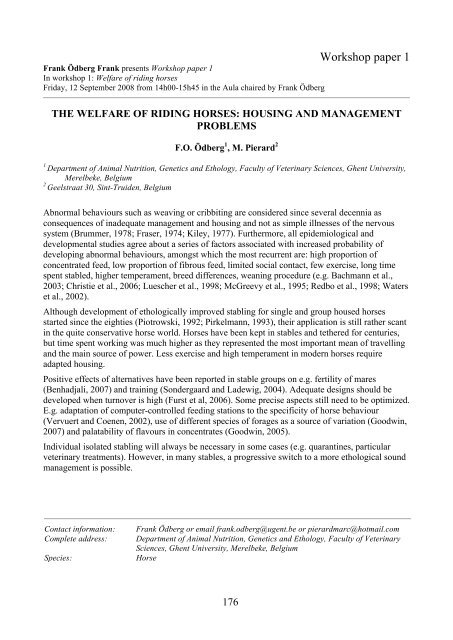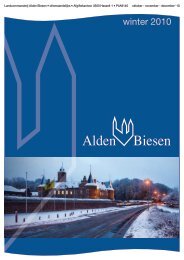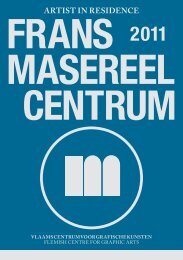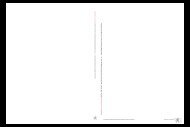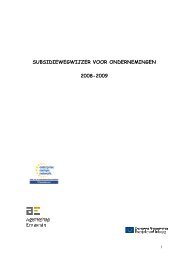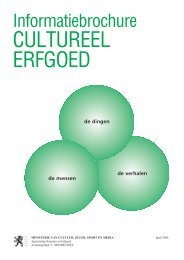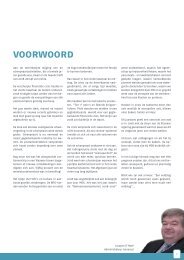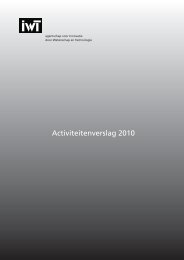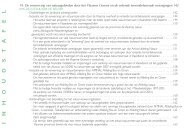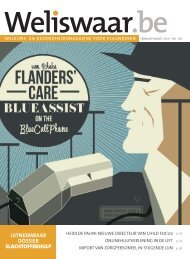Acknowledgements Book of abstracts - Publicaties - Vlaanderen.be
Acknowledgements Book of abstracts - Publicaties - Vlaanderen.be
Acknowledgements Book of abstracts - Publicaties - Vlaanderen.be
Create successful ePaper yourself
Turn your PDF publications into a flip-book with our unique Google optimized e-Paper software.
Frank Öd<strong>be</strong>rg Frank presents Workshop paper 1<br />
In workshop 1: Welfare <strong>of</strong> riding horses<br />
Friday, 12 Septem<strong>be</strong>r 2008 from 14h00-15h45 in the Aula chaired by Frank Öd<strong>be</strong>rg<br />
176<br />
Workshop paper 1<br />
THE WELFARE OF RIDING HORSES: HOUSING AND MANAGEMENT<br />
PROBLEMS<br />
F.O. Öd<strong>be</strong>rg 1 , M. Pierard 2<br />
1 Department <strong>of</strong> Animal Nutrition, Genetics and Ethology, Faculty <strong>of</strong> Veterinary Sciences, Ghent University,<br />
Merel<strong>be</strong>ke, Belgium<br />
2 Geelstraat 30, Sint-Truiden, Belgium<br />
Abnormal <strong>be</strong>haviours such as weaving or cribbiting are considered since several decennia as<br />
consequences <strong>of</strong> inadequate management and housing and not as simple illnesses <strong>of</strong> the nervous<br />
system (Brummer, 1978; Fraser, 1974; Kiley, 1977). Furthermore, all epidemiological and<br />
developmental studies agree about a series <strong>of</strong> factors associated with increased probability <strong>of</strong><br />
developing abnormal <strong>be</strong>haviours, amongst which the most recurrent are: high proportion <strong>of</strong><br />
concentrated feed, low proportion <strong>of</strong> fibrous feed, limited social contact, few exercise, long time<br />
spent stabled, higher temperament, breed differences, weaning procedure (e.g. Bachmann et al.,<br />
2003; Christie et al., 2006; Luescher et al., 1998; McGreevy et al., 1995; Redbo et al., 1998; Waters<br />
et al., 2002).<br />
Although development <strong>of</strong> ethologically improved stabling for single and group housed horses<br />
started since the eighties (Piotrowski, 1992; Pirkelmann, 1993), their application is still rather scant<br />
in the quite conservative horse world. Horses have <strong>be</strong>en kept in stables and tethered for centuries,<br />
but time spent working was much higher as they represented the most important mean <strong>of</strong> travelling<br />
and the main source <strong>of</strong> power. Less exercise and high temperament in modern horses require<br />
adapted housing.<br />
Positive effects <strong>of</strong> alternatives have <strong>be</strong>en reported in stable groups on e.g. fertility <strong>of</strong> mares<br />
(Benhadjali, 2007) and training (Sondergaard and Ladewig, 2004). Adequate designs should <strong>be</strong><br />
developed when turnover is high (Furst et al, 2006). Some precise aspects still need to <strong>be</strong> optimized.<br />
E.g. adaptation <strong>of</strong> computer-controlled feeding stations to the specificity <strong>of</strong> horse <strong>be</strong>haviour<br />
(Vervuert and Coenen, 2002), use <strong>of</strong> different species <strong>of</strong> forages as a source <strong>of</strong> variation (Goodwin,<br />
2007) and palatability <strong>of</strong> flavours in concentrates (Goodwin, 2005).<br />
Individual isolated stabling will always <strong>be</strong> necessary in some cases (e.g. quarantines, particular<br />
veterinary treatments). However, in many stables, a progressive switch to a more ethological sound<br />
management is possible.<br />
Contact information: Frank Öd<strong>be</strong>rg or email frank.od<strong>be</strong>rg@ugent.<strong>be</strong> or pierardmarc@hotmail.com<br />
Complete address: Department <strong>of</strong> Animal Nutrition, Genetics and Ethology, Faculty <strong>of</strong> Veterinary<br />
Sciences, Ghent University, Merel<strong>be</strong>ke, Belgium<br />
Species: Horse


